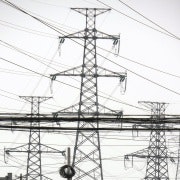Choking on Canberra's energy policy pollution
No matter how hard the boosters, the ideologues and the wishful thinkers try, the energy debate is not black and white but many shades of grey, as evidenced by a slew of issues coming forward in the first fortnight of August.
One of these is the proposal by Kevin Rudd’s climate change guru-of-choice Ross Garnaut that Australia should set itself a new emissions abatement target of 16 per cent below 2000 levels by the end of the decade.
If ever there is a topic that should be debated by the Labor and Coalition leaders before we get to September 7, this surely is it.
The domestic social and economic implications of (as Ross Garnaut proposed at a Grattan Institute forum) dropping the present bipartisan 5 per cent target in “an honest effort to do no less than the United States” are major – and the chances that the Climate Change Authority will recommend this are not minor.
My proposition is that Kevin Rudd owes it to the electorate and to Australian business to say whether or not, if re-elected, he would be inclined once more to follow Garnaut’s advice.
Former George W. Bush senior energy adviser Randa Fahmy Hudome, who visited Australia last week to speak in Brisbane and Sydney at forums presented by the University of Queensland, Rio Tinto and the Energy Policy Institute of Australia, brandished Dubya’s blue book at her audiences and urged policymakers here to follow his example.
Fahmy Hudome, as associate deputy secretary of the US Department of Energy when Bush won office, was among those ordered by the president to come up quickly with energy action steps for his first term – and she and others, working under the direction of Dick Cheney, produced 105 commitments (published in the blue book).
The administration achieved more than 80 of these actions in the first two years of Bush’s presidency – then, of course, came 9/11 and everything except the war on terror took a back seat.
The point for the next Rudd or Abbott government in Fahmy Hudome’s admonition is that it is the action plan that matters in energy policy, not the political rhetoric.
The current black-and-white basis of Australian energy policy is the 5 per cent abatement commitment and it is afloat in a sea of grey where far too little is anchored in the real world.
Sitting in on the Energy Policy Institute’s Sydney forum discussion panel with Fahmy Hudome, I argued for a new Coalition government to follow the Bush example and produce an energy policy action statement in 2014, not a second edition of the existing energy white paper – which more than a few of us think didn’t do a sufficient job of bridging the gap between the Gillard government’s green hijinks and the reality of pursuing energy export growth and domestic supply security amid the effects of higher and higher power and gas prices and incoherent efforts to reduce the sector’s environmental footprint.
I only found Ross Garnaut’s carbon bombshell in a transcript of the Grattan Institute forum after the Sydney debate or I would have thrown it on the table as an example par excellence of the need for more energy certainty for energy suppliers and consumers alike.
Garnaut told the institute audience that Australia must not be a laggard behind America and Canada in pursuing emissions abatement and it needs to be pointed out that this stricture applies equally to areas such as providing a better local playing field for further LNG developments – Fahmy Hudome points to 20 rival export projects being promoted in the US at present – and to delivering certainty for investors in local electricity and gas supply.
Our rising costs and mare’s nest of project approval processes are a real threat to adding another $100 billion worth of LNG developments to those already underway – while, as Manufacturing Australia points out, there is some $28 billion in economic value and 200,000 factory-related jobs at risk under volatile local energy market conditions.
A Coalition federal government could be best placed to work with Coalition state regimes in Western Australia, Victoria, New South Wales and Queensland in 2014 to provide a significant shift in this environment – but not if it emulates the present wishy-washy approach of the O’Farrell government.
A commitment to producing an energy policy action plan in year one of their time in office by Abbott and co – embracing a taskforce drawn from across all the relevant federal departments – could go a very long way towards creating this new environment.
And not least of the foundations of this approach would need to be a firm view on the abatement target challenge thrown up by Ross Garnaut.
The bane of good energy policy since the middle of the past decade has been the tendency of leaders in Canberra to make sudden dashes in new green directions – either in pursuit of populist support at home or kudos abroad – and Garnaut has done us a favour by highlighting a serious prospect for a new veer.
Now, let Rudd and Abbott tell us how they propose to deal with it – because an awful lot hangs on this.
Keith Orchison, director of consultancy Coolibah Pty Ltd and editor of OnPower, was chief executive of two national energy associations from 1980 to 2003. He was made a Member of the Order of Australia for services to the energy industry in 2004.
















